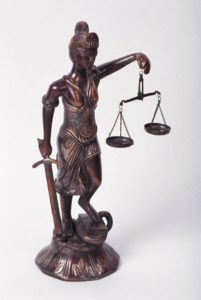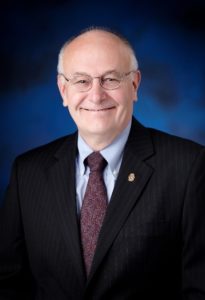New Corporation Sometimes May Be Held Liable for Old Corporation’s Debts
Sharp Thinking
Thinking
No. 75 Perspectives on Developments in the Law from The Sharp Law Firm, P.C. October 2012
New Corporation Sometimes May Be
Held Liable for Old Corporation’s Debts
Directors Owe Fiduciary Duty to Creditors When Corporation Becomes Insolvent
By John T. Hundley, Jhundley@lotsharp.com, 618-242-0246
A court may hold that a new corporation is liable for the debts of a predecessor corporation where the common shareholders are sufficient to exercise control of the new corporation, an Appellate Court panel in Chicago has ruled, rejecting an argument that the ownership of the two corporations had to be identical.
The panel in Workforce Solutions v. Urban Serv. of Am., Inc., 2012 IL App (1st) 111410, also found that directors of the predecessor might be personally liable for its debts because of alleged breaches of a fiduciary duty to manage the corporation in the interests of creditors once it had become solvent. It also refused to find an independent cause of action for alleged discovery violations.
“Mere Continuation” Doctrine at Issue: At issue in Workforce was the “mere continuation”  doctrine which functions as an exception to the general rule that a corporation which merely purchases the assets of another (as opposed to merging with it, or acquiring its stock) does not become responsible for the predecessor’s debts.[1] That exception applies “when the purchasing corporation is merely a continuation or reincarnation of the selling corporation,” the panel said, citing Pielet v. Pielet, 407 Ill. App. 3d 474 (2010). “The purchasing corporation is the mere continuation of the selling corporation when ‘the purchasing corporation maintains the same or similar management and ownership but merely wears different clothes.’”
doctrine which functions as an exception to the general rule that a corporation which merely purchases the assets of another (as opposed to merging with it, or acquiring its stock) does not become responsible for the predecessor’s debts.[1] That exception applies “when the purchasing corporation is merely a continuation or reincarnation of the selling corporation,” the panel said, citing Pielet v. Pielet, 407 Ill. App. 3d 474 (2010). “The purchasing corporation is the mere continuation of the selling corporation when ‘the purchasing corporation maintains the same or similar management and ownership but merely wears different clothes.’”
 The panel acknowledged that “identity of ownership” usually is a key element in establishing this exception. However, citing Dearborn Maple Venture, LLC v. SCI Ill. Serv., Inc., 2012 IL App (1st) 103513, it said that “the continuity of shareholders necessary to a finding of mere continuation does not require complete identity between the shareholders of the former and successor corporations.” Rather, the panel said, differences in shareholders are “consistent with mere continuation as long as the former owners retain a controlling interest in the successor entity.”
The panel acknowledged that “identity of ownership” usually is a key element in establishing this exception. However, citing Dearborn Maple Venture, LLC v. SCI Ill. Serv., Inc., 2012 IL App (1st) 103513, it said that “the continuity of shareholders necessary to a finding of mere continuation does not require complete identity between the shareholders of the former and successor corporations.” Rather, the panel said, differences in shareholders are “consistent with mere continuation as long as the former owners retain a controlling interest in the successor entity.”
Because the trial court had sought “complete unity” between the ownership of the old and new corporations, the panel reversed the decision in favor of the defendants and sent the case back for analysis under the more liberal standard.
Fiduciary Duty Also Found: On the fiduciary duty claim, the panel acknowledged that  generally corporate officers only owe a fiduciary duty to the corporation and its shareholders. However, citing Paul H. Schwendener, Inc. v. Jupiter Elec. Co., 358 Ill. App. 3d 65 (2005), it held that under certain circumstances an officer may owe a fiduciary duty to the corporation’s creditors. “Specifically, once a corporation becomes insolvent, an officer’s fiduciary duty extends to the creditors of the corporation because, from the moment insolvency arises, the corporation’s assets are deemed to be held in trust for the benefit of its creditors,” the court said.
generally corporate officers only owe a fiduciary duty to the corporation and its shareholders. However, citing Paul H. Schwendener, Inc. v. Jupiter Elec. Co., 358 Ill. App. 3d 65 (2005), it held that under certain circumstances an officer may owe a fiduciary duty to the corporation’s creditors. “Specifically, once a corporation becomes insolvent, an officer’s fiduciary duty extends to the creditors of the corporation because, from the moment insolvency arises, the corporation’s assets are deemed to be held in trust for the benefit of its creditors,” the court said.
Although not necessary to its decision, the panel also approvingly cited Delaware law under which a fiduciary duty to creditors may be found in cases of “fraud . . . or a violation of a statute.”
No Cause of Action for Discovery Violation: Workforce was not a complete victory for the plaintiff, however. In the trial court, plaintiff had unsuccessfully asserted claims arising out of defendants’ alleged failure to produce all documents in their possession in a previous lawsuit. It claimed the failure to produce gave rise to civil actions for breach of a “duty of disclosure and candor” and for fraudulent concealment.
 Distinguishing cases arising under partnership law and cases where the failure to disclose was held to toll the statute of limitations on a claim for which there was an independent basis, the panel said it found no support “for an independent cause of action arising out of an alleged breach of a duty of disclosure and candor.”
Distinguishing cases arising under partnership law and cases where the failure to disclose was held to toll the statute of limitations on a claim for which there was an independent basis, the panel said it found no support “for an independent cause of action arising out of an alleged breach of a duty of disclosure and candor.”
With respect to the claim for fraudulent concealment, the court recognized that fraud may consist of “the intentional omission or concealment of a material fact under circumstances creating an opportunity to speak,” citing Hassan v. Yusuf, 408 Ill. App. 3d 327 (2011). However, to establish fraud for failure to speak a plaintiff must establish the existence of a “special or fiduciary relationship, which would raise a duty to speak,” the court said. Because plaintiff had failed to allege a fiduciary relation in the context of the alleged discovery violations, the panel said the action for fraud was properly dismissed.
Case’s Legacy Unclear: Workforce’s rejection of an independent cause of action for discovery violations is precedential and important in rejecting doctrines that otherwise would have had broad and ill-defined limitations. This part of the decision is unlikely to draw much criticism. The decision’s  holding on the fiduciary duty to creditors is well supported by prior law, though that precedent is often overlooked, a phenomenon which Workforce will make more difficult.
holding on the fiduciary duty to creditors is well supported by prior law, though that precedent is often overlooked, a phenomenon which Workforce will make more difficult.
What may expose Workforce to the greatest criticism is its treatment of the mere continuation doctrine, and that criticism may stem in part from difficulty in knowing precisely what the court held. Defendants argued that the common ownership in this complex fact situation was less than one-third, while plaintiff alleged it was much greater. The panel did not resolve that factual dispute, but held that the dismissal of the pleading as insufficient on its face was improper. What Workforce means as a matter of substantive law thus remains subject to debate and future interpretation.
[1] Other exceptions include (1) where there is an express or implied agreement to assume the liabilities, (2) where the transaction amounts to a consolidation or merger, and (3) where the transaction is for the fraudulent purpose of escaping liability for the seller’s obligations. For further information on the non-liability rule and exceptions thereto, see Hundley, Business Expansion Through Asset Acquisition: Some Problems Posed By Product Liability Doctrines, 77 Ill. B.J. 492 (1989).
THE SHARP LAW FIRM, P.C.
1115 Harrison, P.O. Box 906, Mt. Vernon, IL 62864 • Telephone 618-242-0246 • Facsimile 618-242-1170 • www.thesharpfirm.com
Business Transactions • Litigation • Financial Law • Problem Finances • Real Estate • Corporate • Commercial Disputes • Creditors’ Rights •
Arbitration • Administrative Law • Employment Matters • Estate Planning • Probate • Family Matters
75
